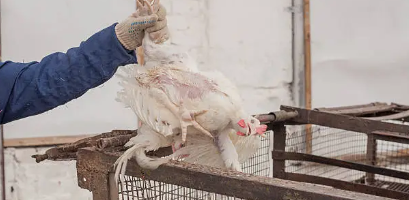The barbaric custom of factory farming, dates back to the 1920s, The United States. The ideology surrounding it was that, if a large number of animals were to be confined to cramped up spaces and have feed delivered to them, it would ensure optimum usage and availability of meat.
Moving eastwards to Britain, this country, in order to cut costs spent on importing meat offered its farmers subsidies under the new Agricultural Act of 1947. It was believed that implementing the above would solve Britain’s food crises and help it recover economically from the damages caused by World War II.
Moving further eastwards we arrive at India. In this particular region we get to observe that, for the longest time meat has been significantly more expensive than vegetables owing to the huge percentage of vegetarians. The actual shift towards factory farming in India began way towards the end of the 20th century accompanied by economic reforms. Taking inspiration from the western models of factory farming, intensive farming and poultry techniques were adopted. Leading us to the conclusion that prior to urbanization and western influence the country saw no need for such an inhumane and intensive practice.
Having this information in place, may lead one to question if factory farming is sustainable, or even economically feasible.
Is factory farming a sustainable practice? if not, what are its consequences?
Putting it simply, factory farming is NOT sustainable in the slightest for a plethora of reasons. First and foremost, it contributes to 37% and 64% of methane and ammonia emissions respectively, and this aggregate is only going to increase in the coming years. Secondly, it is a resource intensive practice, implying that it requires a load of land and natural resources causing constant encroachment of habitats and deforestation of forests. What this means for our future generations is that they may not be able to enjoy nature as we do, or even breathe remotely clean air (in terms of AQI).
Is factory farming economically feasible?
The answer is once again, no, it is not feasible. Although several counter arguments may arise while addressing this question, I am of the opinion that factory farming, specifically poultry is not capable of sustaining the economy. This is due to the burden this industry puts on environmental, social and ethical concerns along with long term sustainability that require incredibly high costs for reparation.
Putting aside the tangible consequences, I feel it is way more important to talk about the ethical and humane aspects of this industry. Factory farming is the epitome of animal abuse, slavery, rape, imprisonment and all the forms of abuse one can imagine, How can we love one animal and eat another? is that not hypocrisy at its finest?
Do we even have the right to talk about ethics, when we are essentially treating living sensational beings as parts of a production machine? From the moment a factory animal is born, its only purpose is to produce meat/poultry products and offsprings.
Coming to a conclusion, it is THE NEED of the hour to come up with humane, ethical and sustainable alternatives to factory farming before it is simply too late. practices like backyard farming, veganism, or even small scale humane poultry farming would put an end to this barbaric custom.

